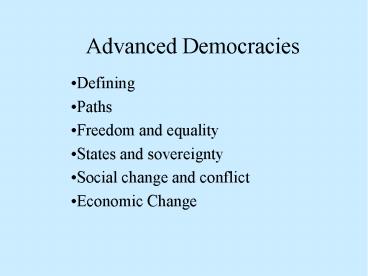Advanced Democracies PowerPoint PPT Presentation
Title: Advanced Democracies
1
Advanced Democracies
- Defining
- Paths
- Freedom and equality
- States and sovereignty
- Social change and conflict
- Economic Change
2
Quiz
- How are Postmodern values different from Modern
values? - What is the major dilemma facing Advanced
Democracies in regard to the welfare state and an
aging population?
3
Defining Advanced Democracies
- Which countries are these?
- Past definitions first, second, third worlds
- Problems with these terms democracy and
capitalism, end of Cold War - Countries move between different categories!
- Definition institutionalized democracy and high
level of economic development
4
Paths of Advanced Democracies
- How did they get to where they are today?
- Various paths of democratization and
industrialization - Early democratization and industrialization (US,
Canada) - Late democratization, early industrialization
(Germany) - Late industrialization, late democratization
(Japan)
5
Freedom and Equality in the Advanced Democracies
- All share
- institutionalized liberal democracy
- Private property and free markets
- High level of economic development
- Differences, though, in how freedom and equality
reconciled - Civil liberties
- Participation and competition
- State role in the economy (liberal, social
democratic, mercantilist)
6
States and Sovereignty
- Hallmarks of modern politics
- Changing in the advanced democracies?
- Pull of authority upward Integration
- Pull of authority downward Devolution
- Both challenge state power
7
Integration and the European Union
- Created after World War Two
- Idea to prevent war through interdependence
- Pool resources to have greater authority in
international system (Cold War) - Slow development from 1951 to present
- Transfer of sovereignty incrementally
8
Institutions of the EU
- Bodies that reflect domestic political
institutions, with some differences - European Commission representatives appointed
from member states, make legislation - Council of Ministers ministers from member
states cabinets, approve legislation - European Parliament directly elected members
that approve legislation - European Court of Justice interprets EU law
9
From Intergovernmental to Supranational?
- EU has gained more power over time
- No longer intergovernmental
- Now supranationallike a state of its own
- Monetary Unionmost member states gave up own
currency in 2002 for euro - Major loss of sovereigntycountries central
banks lost many of their traditional powers - How good has been euro for EU members?
10
Enlargement of the EU
- In 2004, took on ten new members
- Most post-communist countries of Eastern Europe,
former Soviet Union - How will this affect EU?
- Decision making in a larger body
- Costs of subsidies and benefits for poorer new
members causes conflict - Former Soviet States Skepticism
- Far from over
11
Rejection of the EU Constitution
- Why?
- - Fear of loss of Sovereignty (Too Liberal and
too Socialist) - - Too long and too difficult to understand
- - Democratic Deficit
12
Supranationalism and Democracy
- Who controls the EU?
- Absence of direct popular control
- Notion of the democratic deficit
- Recent rejection of EU constitution by some
members has led to confusion over future of EU
and what changes are needed
13
Devolution and Democracy
- Power not just moving up, as with EU
- Also moving down
- Devolution powers and resources are transferred
away from central state institutions and vested
at a lower level
14
Why Devolution?
- Counter public mistrust of distant government
and state - Greater flexibility and local participation
- Resolve ethnic or national identity conflicts by
giving more power to discontent groups - Helps reinvigorate politics or simply undercuts
state sovereignty?
15
Limits of Devolution
- Post-September 11, move back toward
centralization - State power increased, devolution seen as a
possible threat to security
16
Social Change and Conflict Postmodern Values
- Changes at societal level as well
- Traditional modern values
- Rationality and science
- Individualism and autonomy
- Materialism
- Growing skepticism of these values by 1960s
- Environmentalism
- Criticism of nationalism and patriotism
17
The Content of Postmodern Values
- Less focused on idea of progress
- Quality of life issues more central
- Health
- Environment
- Leisure
- Personal equality
- Diversity
- Hostility to centralized power (devolution,
integration)
18
Diversity, Identity, and the Challenge to
Postmodern Values
- Are postmodern values really taking hold?
- Affected in part by wave of immigration across
advanced democracies - Large numbers
- Diverse groups of peoples within and between
advanced democracies
19
Identity and Migration
- Assimilation or multiculturalism?
- Will migration undercut postmodern values?
- Will advanced democracies become more different
from each other due to migration?
20
Economic Change Postindustrialism
- Modern economies built upon industrialization,
away from agriculture - Now moving from industry and toward service
sector non-tangible goods - Finance, insurance
- Communication, education
- Legal, health care
- Majority of people in advanced democracies now
work in service sector
21
Postindustrialisms Effects
- Greater devolution of industry?
- Less hierarchical
- More virtual
- More international
- More flexible and autonomous
- Reinforces postmodern values?
- Marginalization of those without education?
- Shapes new political struggles?
- How much of this is over-exaggerated?
22
Maintaining the Welfare State
- Important element of most advanced democracies
- Wide array of social expenditures enjoyed by
society - But problems as well
- Increasingly expensive, such as health care,
pensions - Populations getting older!
- Who will pay for this?
- Migration as a way to solve? Will people accept?
23
Future Issues
- States face integration and devolution
- Societies face new values and old ideologies
- Economies face changing workplace and aging
workforce - How will these areas in combination transform
freedom and equality in the coming decades?

